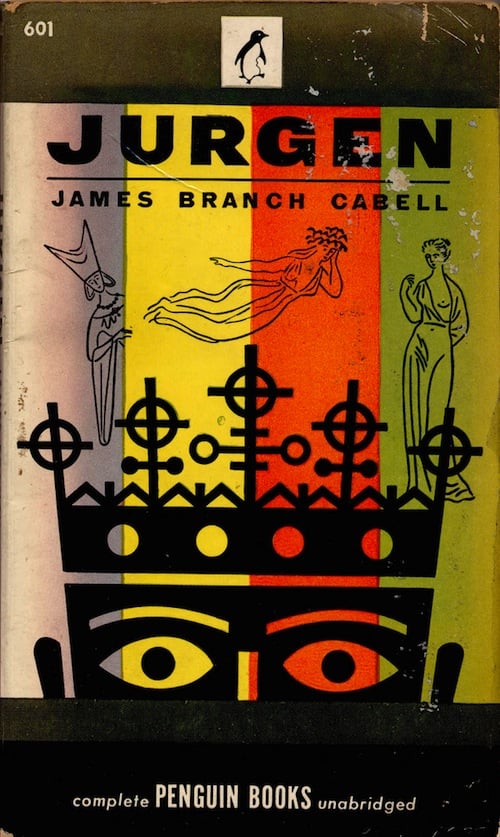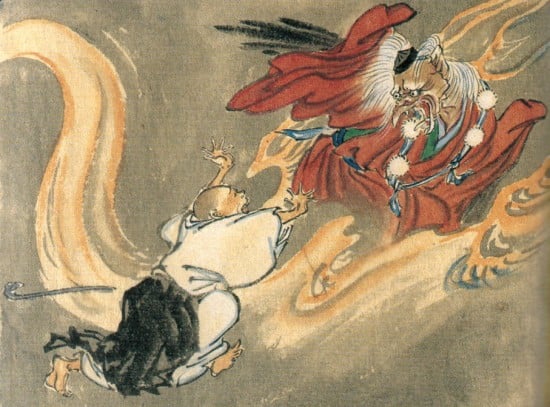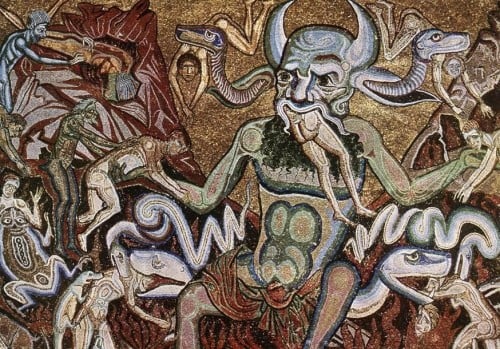Jurgen (35)
By:
November 13, 2015

James Branch Cabell’s 1919 ironic fantasy novel Jurgen, A Comedy of Justice, the protagonist of which seduces women everywhere he travels — including into Arthurian legend and Hell itself — is (according to Aleister Crowley) one of the “epoch-making masterpieces of philosophy.” Cabell’s sardonic inversion of romantic fantasy was postmodernist avant la lettre. HiLoBooks is pleased to serialize Jurgen here at HILOBROW. Enjoy!
Now the tale tells how the devils of Hell were in one of their churches celebrating Christmas in such manner as the devils observe that day; and how Jurgen came through the trapdoor in the vestry-room; and how he saw and wondered over the creatures which inhabited this place. For to him after the Christmas services came all such devils as his fathers had foretold, and in not a hair or scale or talon did they differ from the worst that anybody had been able to imagine.
“Anatomy is hereabouts even more inconsequent than in Cocaigne,” was Jurgen’s first reflection. But the first thing the devils did was to search Jurgen very carefully, in order to make sure he was not bringing any water into Hell.

“Now, who may you be, that come to us alive, in a fine shirt of which we never saw the like before?” asked Dithican. He had the head of a tiger, but otherwise the appearance of a large bird, with shining feathers and four feet: his neck was yellow, his body green, and his feet black.
“It would not be treating honestly with you to deny that I am the Emperor of Noumaria,” said Jurgen, somewhat advancing his estate.
Now spoke Amaimon, in the form of a thick suet-colored worm going upright upon his tail, which shone like the tail of a glowworm. He had no feet, but under his chops were two short hands, and upon his back were bristles such as grow upon hedgehogs.
“But we are rather overrun with emperors,” said Amaimon, doubtfully, “and their crimes are a great trouble to us. Were you a very wicked ruler?”
“Never since I became an emperor,” replied Jurgen, “has any of my subjects uttered one word of complaint against me. So it stands to reason I have nothing very serious with which to reproach myself.”
“Your conscience, then, does not demand that you be punished?”
“My conscience, gentlemen, is too well-bred to insist on anything.”
“You do not even wish to be tortured?”
“Well, I admit I had expected something of the sort. But none the less, I will not make a point of it,” said Jurgen, handsomely. “No, I shall be quite satisfied even though you do not torture me at all.”
And then the mob of devils made a great to-do over Jurgen.
“For it is exceedingly good to have at least one unpretentious and undictatorial human being in Hell. Nobody as a rule drops in on us save inordinately proud and conscientious ghosts, whose self-conceit is intolerable, and whose demands are outrageous.”
“How can that be?”
“Why, we have to punish them. Of course they are not properly punished until they are convinced that what is happening to them is just and adequate. And you have no notion what elaborate tortures they insist their exceeding wickedness has merited, as though that which they did or left undone could possibly matter to anybody. And to contrive these torments quite tires us out.”

“But wherefore is this place called the Hell of my fathers?”
“Because your forefathers builded it in dreams,” they told him, “out of the pride which led them to believe that what they did was of sufficient importance to merit punishment. Or so at least we have heard: but if you want the truth of the matter you must go to our Grandfather at Barathum.”
“I shall go to him, then. And do my own grandfathers, and all the forefathers that I had in the old time, inhabit this gray place?”
“All such as are born with what they call a conscience come hither,” the devils said. “Do you think you could persuade them to go elsewhere? For in that event, we would be deeply obliged to you. Their self-conceit is pitiful: but it is also a nuisance, because it prevents our getting any rest.”
“Perhaps I can help you to obtain justice, and certainly to attempt to secure justice for you is my imperial duty. But who governs this country?”
They told him how Hell was divided into principalities that had for governors Lucifer and Beelzebub and Belial and Ascheroth and Phlegeton: but that over all these was Grandfather Satan, who lived in the Black House at Barathum.
“Well, I prefer,” says Jurgen, “to deal directly with your principal, especially if he can explain the polity of this insane and murky country. Do some of you conduct me to him in such state as becomes an emperor!”
So Cannagosta fetched a wheelbarrow, and Jurgen got into it, and Cannagosta trundled him away. Cannagosta was something like an ox, but rather more like a cat, and his hair was curly.
And as they came through Chorasma, a very uncomfortable place where the damned abide in torment, whom should Jurgen see but his own father, Coth, the son of Smoit and Steinvor, standing there chewing his long moustaches in the midst of an especially tall flame.
“Do you stop now for a moment!” says Jurgen, to his escort.
“Oh, but this is the most vexatious person in all Hell!” cried Cannagosta; “and a person whom there is absolutely no pleasing!”
“Nobody knows that better than I,” says Jurgen.
And Jurgen civilly bade his father good-day, but Coth did not recognize this spruce young Emperor of Noumaria, who went about Hell in a wheelbarrow.
“You do not know me, then?” says Jurgen.
“How should I know you when I never saw you before?” replied Coth, irritably.
And Jurgen did not argue the point: for he knew that he and his father could never agree about anything. So Jurgen kept silent for that time, and Cannagosta wheeled him through the gray twilight, descending always deeper and yet deeper into the lowlands of Hell, until they had come to Barathum.
Footnotes from Notes on Jurgen (1928), by James P. Cover — with additional comments from the creators of this website; rewritten, in some instances, by HiLoBooks.
* Trapdoor — Quite a few persons, we may believe, have descended into Hell through a trapdoor, generally assisted, however, by a rope around their necks.
* “Water into Hell” — Since the Hell of Jurgen’s fathers later shows a marked resemblance to the United States, this sentence is probably aimed at Prohibition, an object of Mr. Cabell’s especial animosity.
* Dithican — In The History of the Damnable Life and Deserved Death of Dr. John Faustus (hereinafter called The History of Dr. Faustus), Dithican was described as a devil in the “form of a large bird, with shining feathers, and four feet; his neck green, and body red, and his feet black.”
* Noumaira — This empire, fallen from its high estate to that of a mere duchy, plays an important part in the later chapters of Gallantry.
* Amaimon — Amaimon was one of the chief devils of Hell. His dominions were on the north side of the infernal gulf.
* Barathum — The History of Dr. Faustus names this as one of the ten kingdoms of Hell. Barathron was a deep pit at Athens, with hooks on the sides, into which criminals were cast.
* Lucifer — In The History of Dr. Faustus, he is ruler of the eastern part of Hell, and is described as sitting “in the manner of a man all hairy, but of brown color like a squirrel, curled, and his tail turning upwards on his back as the squirrels use.”
* Beelzebub — Beelzebub ruled that section of Hell called Septentrio, and ranked second only to Satan. The parts of Hell with their rulers mentioned in chapter 34 are for some reason inconsistently translated. “Septentrio” is “North”, and presumably “the Occident” is simply the West (with no especial association with falling down).
* Belial — This devil was “in form of a bear, with curled black hair to the ground, his ears standing upright; within his ears were as red as blood, out of which issued flames of fire.”
* Ascheroth — Ascheroth was “in the form of a worm, going upright on his tail, and had no feet, but a tail like a slow-worm: under his chops grew two short hands,” and he had “many bristles on his back like a hedgehog.” He ruled that part of Hell called the Occident.
* Phlegeton — Phlegeton [more properly “Phlegethon”] means “burning” and, in classic myth, was a river of fire in the underworld. The History of Dr. Faustus makes him one of the infernal kings, who rules “in the midst of them all.”
* Cannagosta — This demon is described as having “a head like the head of an ass, and a tail like a cat, and claws like an ox.”
* Chorasma — ?
RADIUM AGE SCIENCE FICTION: “Radium Age” is HILOBROW’s name for the 1904–33 era, which saw the discovery of radioactivity, the revelation that matter itself is constantly in movement — a fitting metaphor for the first decades of the 20th century, during which old scientific, religious, political, and social certainties were shattered. This era also saw the publication of genre-shattering writing by Edgar Rice Burroughs, Sax Rohmer, E.E. “Doc” Smith, Jack London, Arthur Conan Doyle, Aldous Huxley, Olaf Stapledon, Karel Čapek, H.P. Lovecraft, Charlotte Perkins Gilman, Yevgeny Zamyatin, Philip Gordon Wylie, and other pioneers of post-Verne/Wells, pre-Golden Age “science fiction.” More info here.
READ GORGEOUS PAPERBACKS: HiLoBooks has reissued the following 10 obscure but amazing Radium Age science fiction novels in beautiful print editions: Jack London’s The Scarlet Plague, Rudyard Kipling’s With the Night Mail (and “As Easy as A.B.C.”), Arthur Conan Doyle’s The Poison Belt, H. Rider Haggard’s When the World Shook, Edward Shanks’ The People of the Ruins, William Hope Hodgson’s The Night Land, J.D. Beresford’s Goslings, E.V. Odle’s The Clockwork Man, Cicely Hamilton’s Theodore Savage, and Muriel Jaeger’s The Man with Six Senses. For more information, visit the HiLoBooks homepage.
SERIALIZED BY HILOBOOKS: Jack London’s The Scarlet Plague | Rudyard Kipling’s With the Night Mail (and “As Easy as A.B.C.”) | Arthur Conan Doyle’s The Poison Belt | H. Rider Haggard’s When the World Shook | Edward Shanks’ The People of the Ruins | William Hope Hodgson’s The Night Land | J.D. Beresford’s Goslings | E.V. Odle’s The Clockwork Man | Cicely Hamilton’s Theodore Savage | Muriel Jaeger’s The Man With Six Senses | Jack London’s “The Red One” | Philip Francis Nowlan’s Armageddon 2419 A.D. | Homer Eon Flint’s The Devolutionist | W.E.B. DuBois’s “The Comet” | Edgar Rice Burroughs’s The Moon Men | Charlotte Perkins Gilman’s Herland | Sax Rohmer’s “The Zayat Kiss” | Eimar O’Duffy’s King Goshawk and the Birds | Frances Hodgson Burnett’s The Lost Prince | Morley Roberts’s The Fugitives | Helen MacInnes’s The Unconquerable | Geoffrey Household’s Watcher in the Shadows | William Haggard’s The High Wire | Hammond Innes’s Air Bridge | James Branch Cabell’s Jurgen | John Buchan’s “No Man’s Land” | John Russell’s “The Fourth Man” | E.M. Forster’s “The Machine Stops” | John Buchan’s Huntingtower | Arthur Conan Doyle’s When the World Screamed | Victor Bridges’ A Rogue By Compulsion | Jack London’s The Iron Heel | H. De Vere Stacpoole’s The Man Who Lost Himself | P.G. Wodehouse’s Leave It to Psmith | Richard Connell’s “The Most Dangerous Game” | Houdini and Lovecraft’s “Imprisoned with the Pharaohs” | Arthur Conan Doyle’s “The Sussex Vampire.”
ORIGINAL FICTION: HILOBROW has serialized three novels: James Parker’s The Ballad of Cocky The Fox (“a proof-of-concept that serialization can work on the Internet” — The Atlantic); Karinne Keithley Syers’s Linda Linda Linda (which includes original music); and Robert Waldron’s roman à clef The School on the Fens. We also publish original stories and comics. These include: Matthew Battles’s stories “Gita Nova“, “Makes the Man,” “Imago,” “Camera Lucida,” “A Simple Message”, “Children of the Volcano”, “The Gnomon”, “Billable Memories”, “For Provisional Description of Superficial Features”, “The Dogs in the Trees”, “The Sovereignties of Invention”, and “Survivor: The Island of Dr. Moreau”; several of these later appeared in the collection The Sovereignties of Invention | Peggy Nelson’s “Mood Indigo“, “Top Kill Fail“, and “Mercerism” | Annalee Newitz’s “The Great Oxygen Race” | Flourish Klink’s Star Trek fanfic “Conference Comms” | Charlie Mitchell’s “A Fantasy Land” | Charlie Mitchell’s “Sentinels” | Joshua Glenn’s “The Lawless One”, and the mashup story “Zarathustra vs. Swamp Thing” | Adam McGovern and Paolo Leandri’s Idoru Jones comics | John Holbo’s “Sugarplum Squeampunk” | “Another Corporate Death” (1) and “Another Corporate Death” (2) by Mike Fleisch | Kathryn Kuitenbrouwer and Frank Fiorentino’s graphic novel “The Song of Otto” (excerpt) | John Holbo’s graphic novel On Beyond Zarathustra (excerpt) | “Manoj” and “Josh” by Vijay Balakrishnan | “Verge” by Chris Rossi, and his audio novel Low Priority Hero | EPIC WINS: THE ILIAD (1.408-415) by Flourish Klink | EPIC WINS: THE KALEVALA (3.1-278) by James Parker | EPIC WINS: THE ARGONAUTICA (2.815-834) by Joshua Glenn | EPIC WINS: THE MYTH OF THE ELK by Matthew Battles | TROUBLED SUPERHUMAN CONTEST: Charles Pappas, “The Law” | CATASTROPHE CONTEST: Timothy Raymond, “Hem and the Flood” | TELEPATHY CONTEST: Rachel Ellis Adams, “Fatima, Can You Hear Me?” | OIL SPILL CONTEST: A.E. Smith, “Sound Thinking | LITTLE NEMO CAPTION CONTEST: Joe Lyons, “Necronomicon” | SPOOKY-KOOKY CONTEST: Tucker Cummings, “Well Marbled” | INVENT-A-HERO CONTEST: TG Gibbon, “The Firefly” | FANFICTION CONTEST: Lyette Mercier’s “Sex and the Single Superhero”
